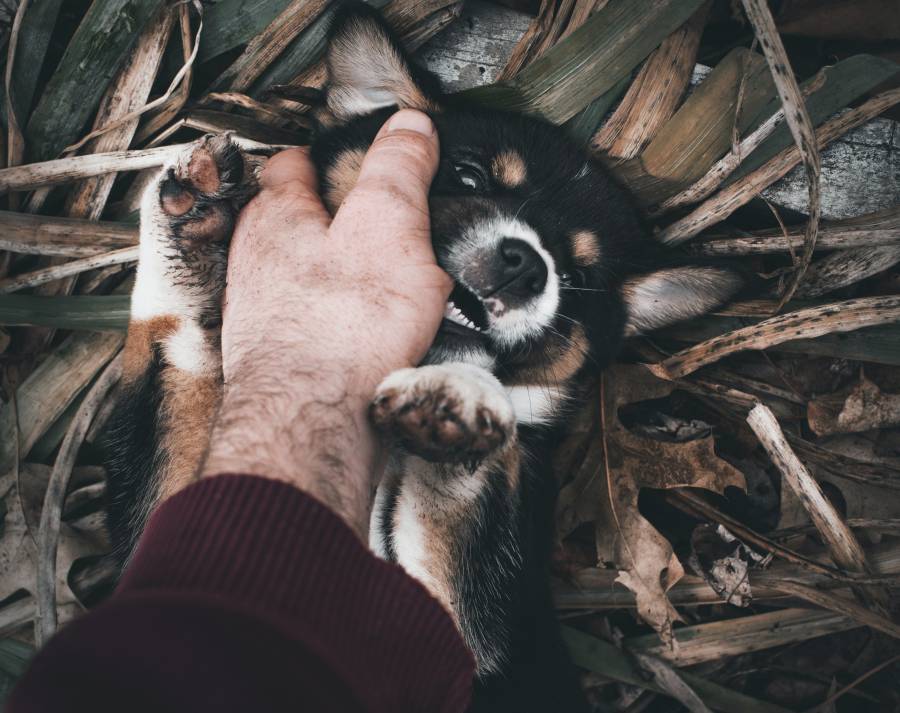Quick Navigation
Having a puppy is one of the joys in life because it can be the cutest of pets.
One way of playing/communicating is by biting, which can be a problem as it can cause serious injury to the owner.
Some puppies can play too roughly and tend to bite on things or people that they should not.
Puppy biting may seem harmless and fun, but once it’s grown into an adult dog, a playful bite can create real problems.

It is mainly for a visitor or a stranger. If this behavior is not controlled early, it can cause severe problems as the puppy grows into an adult dog.
Puppy Bite
Biting is normal behavior in dogs, especially puppies.
While it is usually teething, a puppy can bite to examine objects, communicate, and play.
This behavior is natural for a puppy because it uses its mouth to explore the world.
Much like a baby uses its hands and eyes, it is essential to realize that nipping is not an indication of aggression.
It is relatively nothing more than curious exploration.
Biting is very important to a puppy’s development as it teaches bite inhibition.
However, there are cases when the bite goes well beyond normal levels and needs to be controlled.
It is for the safety of those around it.
My Puppy Bit Me And Drew Blood – What Should I Do?
A puppy has sharp teeth but lacks the real jaw strength to do anything other than draw a little blood.
A puppy who hasn’t learned how to suppress biting can be tedious and dangerous, with the most uncomplicated play session often escalating into something else.
Can I Get Rabies From My Puppy’s Bite?
Let’s start with what rabies is. Rabies is a viral disease that any mammal can transmit.
Any warm-blooded mammal can become infected with rabies, but animals cannot transmit the virus until they begin to show rabies symptoms.
In the beginning, infected animals may act differently than usual, acting more amiable, hostile, or anxious.
Animals may develop extreme sensitivity to light and sound as the condition worsens.
They might experience seizures or turn violent, and might become clumsy, bump into things, or randomly snap at humans, animals, or other moving objects.
Occasionally, they over-lick and bite the area where they were bitten.
It’s possible that they start eating odd things and hiding in shadowy areas.
They might experience paralysis of the nerves in their head and throat during the last stage, as well as a fever.
Your puppy needs to have vaccines if he is 12 weeks or older when you adopt him.
He shouldn’t have the virus if he’s been vaccinated.
It is usually transferred through the bite of a rabid animal, that is, the carrier of the virus.
The virus is usually transmitted through an animal’s saliva, which bites and breaks the skin.
The virus attacks its host’s central nervous system and causes various problems.
Your pet is at greater risk if it comes into contact with wild animals, particularly bats, raccoons, skunks, and foxes.
The East Coast, from Florida to Maine, is where it is most common.
What Should I Do If My Puppy Bit Me And Drew Blood?
Puppies bite mainly to get our attention because they want to interact with us.
If you give them that attention when necessary, the puppy will reduce that nip.
Most often, nothing terrible will happen to you when you come in contact with your puppy, even if your puppy bites you.
However, if your puppy bites you and pierces/breaks your skin, bacteria from its mouth can get into your body, leading to infection.
It is what you should do:
First Aid: Stop The Bleeding
- Control bleeding: When your puppy bites you, and it draws blood, firstly, you need to control the bleeding by applying pressure to the bite with a clean towel to stop any bleeding. Avoid using a tourniquet unless you have severe bleeding that cannot otherwise be controlled.
- Wound cleaning: After the bleeding is under control, wash the wound and the affected area with soap and running water for a few minutes. Preferably warm water will help remove germs and bacterial particles from the wound to reduce the risk of infection.
Neither soak nor scrub the wound and try to clean the inside of the wound. Ensure you rinse off the soap, or it may irritate later.
- Cover the wound: You may apply an antibiotic ointment or a thin layer of petroleum jelly to the affected area where your puppy bit you before covering it. Apply a clean and sterile bandage to the wound.
- Get medication: Ask your doctor if you can take an over-the-counter antibiotic or pain reliever such as acetaminophen, ibuprofen, or naproxen, and strictly follow the prescription.
- Changing Dressings: Apply more petroleum jelly and replace the dressing as needed. It would be best to change bandages several times until the bite has healed.

Moreso, it is vital to check for signs of infection, including:
- Redness
- Swelling
- Fever or warmth around the wound area
- Weeping pus
Seek Medical Attention
See a doctor at the nearest health center immediately.
Don’t forget to mention that your puppy bit you and drew some blood.
Your doctor should conduct a risk assessment based on their expertise to determine whether you need a rabies vaccine or specific antibodies to combat infection. It solely depends on the stringency of the bite or injury.
If the healthcare professional considers it necessary to have a series of vaccinations, ensure that you have the complete series of vaccinations.
You will have to return to the health center for additional vaccinations.
It is essential as a single vaccine is not enough to ensure your safety.
You should see a doctor whenever your puppy bites you and draw some blood, no matter how serious.
Severe infections can be rare, but proper prevention is key to keeping these rates to their minimum.
Effective Ways To Reduce Puppy Bites
Even if a puppy has shown that it has learned some inhibition, it will need more training in its new home to reinforce that behavior.
Humans are more likely to feel pain when bitten than a puppy, so the slightest sign of bite pressure is a behavior that needs correcting.
Most puppy bites don’t intend to hurt people.
Dogs like retrievers can carry an egg in their mouth without biting it, and they are gentle enough with their teeth.
Even very gentle bites on their own can be frightening to young children and even adults.
And so, weaning your pup off from playing with its teeth at an early age is a good habit.
To reduce your puppy’s bite, you can start using a chew toy, such as a tug-of-war rope or a rubber chew, to play with your pup.
As long as the puppy’s teeth are not in contact with your skin, keep praising them.
It is good to let the puppy win now and then, which will help build its confidence.
Once the puppy’s teeth start making contact with your skin, stand up, and let go of the toy if necessary.
Walk away from the puppy, say for 20-30 seconds.
If your puppy approaches the side you are looking at, ignore it until you finish counting.
Play with your pup again until it learns to avoid putting its teeth on you.
If your puppy bites you and draws some blood under other circumstances, a simple scolding is likely to do the trick.
When a puppy grows into an adult dog, a playful bite can actually cause serious problems.
Although it may seem fun and harmless when it happens to a puppy.
Conclusion
A much known effective way to teach your pup not to bite is to teach it to trust and respect you.
It will be critical in all aspects of raising your puppy and will be able to correct any bad behavior that it might develop.
Also, train your puppy to reduce its natural biting reflex.
Biting may seem cute and harmless when your pup is very young, but it won’t be when it is fully grown and much more potent.
Because of this, puppies need to learn to control and stop biting before they are four months old.

Zoey is a long-time pet owner and animal rights advocate, a vital part of Purrfect n’ Pawesome. She shares her unique experiences and learnings with her readers to enhance their understanding of pet behavior and nutrition. Along with being an active pet writer, she volunteers at multiple animal shelters, rescue centres with some bespokenly awesome pets.
Zoey has a lot to share when raising the pets and spending life being their true friends. She has a quite pampered Persian cat and a Ragdoll, whom she loves the most. Readout her blogs to know more about being a responsible parent to your beloved pets.
“I love to be around cats and dogs; that’s my passion and my trick to get away from all the negativity and soaking in unconditional love and affection. Being attached to this platform gives me the reason to be vocal about pet love, care, and nurturing. Although I am not an expert or veterinarian by any means, I have a lot of experience and learnings to share with my fellow readers.”

![Dog Poop Like Jelly With Blood [Causes] Dog Poop Like Jelly With Blood [Causes]](https://purrfectnpawesome.com/wp-content/uploads/2022/03/Dog-Poop-Like-Jelly-with-Blood-GCo-Causes-and-Home-Remedies-150x150.jpg)